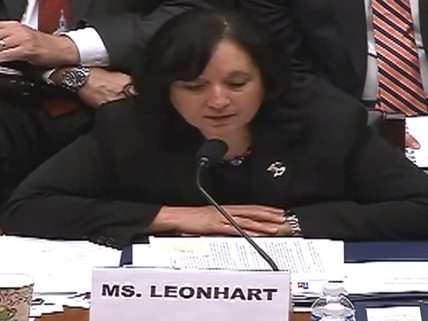House Oversight Committee Has 'No Confidence' in DEA Chief
Drug warriors' wild sex parties cast an unflattering light on Michele Leonhart.

Today nearly half of the legislators who sit on the House Oversight and Government Reform Committee, including the chairman and ranking Democrat, expressed "no confidence" in Michele Leonhart, head of the Drug Enforcement Administration (DEA). They were disappointed not by her failure to win that darn war on drugs already but by her lenient treatment of DEA agents accused of having wild sex parties underwritten by Colombian drug traffickers and American taxpayers. "After over a decade of serving in top leadership positions at DEA," said 20 of the committee's 43 members, "Administrator Leonhart has been woefully unable to change or positively influence the pervasive 'good old boy' culture that exists throughout the agency. From her testimony, it is clear that she lacks the authority and will to make the tough decisions required to hold those accountable who compromise national security and bring disgrace to their position. Ms. Leonhart has lost the confidence of this Committee to initiate the necessary reforms to restore the reputation of a vital agency."
Some highlights of the testimony to which the statement refers, courtesy of The New York Times:
"When we have bad apples who repeatedly do the same type of behavior, compromise our national security, then they need to lose their national security clearances and they need to be fired," said Representative Jason Chaffetz, a Utah Republican and the committee's chairman.
Ms. Leonhart told the committee that she did not have the power to fire agents or revoke their security clearances over what Mr. [Elijah] Cummings [the ranking Democrat] called "a truly breathtaking recklessness."
"Honestly, what power do you have?" asked Representative Trey Gowdy, Republican of South Carolina. "You have to work with agents over whom you can't discipline and have no control. What the hell do you get to do?"
You can watch more of Leonhart's delightfully brutal interrogation here.
Drug policy reformers are taking this opportunity to reiterate their longstanding objections to Leonhart, who was a singularly uninspired choice for a president who once called the war on drugs "an utter failure." Leonhart, an unreconstructed drug warrior, famously refused to say whether heroin is more dangerous than marijuana and even criticized her boss in the White House for conceding that alcohol is. Bill Piper, director of national affairs at the Drug Policy Alliance, says:
Instead of disciplining federal agents who allegedly participated in sex parties funded by drug cartels, Leonhart let the agents off with a 10-day suspension. This comes just as details are emerging of a decades-long warrantless spying program conducted by the DEA on billions of U.S. phone calls.
It's ridiculous how scandal-ridden the DEA has become.
Leonhart even refused to acknowledge if marijuana was safer than cocaine and heroin back in 2012—in open contradiction with the administration she works for. This is the head of our country's drug enforcement. This is unacceptable.
All told, these scandals show an out-of-control agency, run amok and literally in bed with organized crime. And it's an important example of how prohibition breeds corruption.
It's time to end the war on drugs and rein in the DEA.
Neill Franklin, executive director of Law Enforcement Against Prohibition, adds:
There's simply no excuse for the outrageous behavior of the DEA's so-called leadership. Leonhart just helps us add to the list of reasons of why we need to rethink our entire approach to drug policy.
Although the connection may seem strained, Piper and Franklin are right that the prostitute party scandal illustrates the folly of prohibition. Public officials who become accustomed to pissing away taxpayer money in a futile endeavor such as the war on drugs are less likely to refrain from pissing it away on booze and women, especially if they grow to resent their pointless mission. They may also think little of accepting party favors from the drug traffickers they are supposedly fighting—a relatively mild form of the corruption that prohibition fosters.
More on the DEA's mass surveillance.


Show Comments (51)